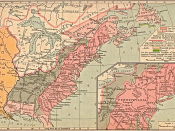The concept that a nation must export goods of greater monetary value than it imports, or mercantilism, held the colonies together and built them into a unity that would soon become a nation more powerful than England itself. Mercantilist ideas shaped the policies of all major nations of Europe from the sixteenth to the eighteenth centuries. Through the mercantile theory Britain expected the American colonies to furnish products and raw materials needed in England, buy British goods, and not bother with ideas of self-government or economic independence. Though the colonies received direct economic benefit from the mercantile theory, they quickly came to resent it and the burdensome liabilities it possessed, therefore causing its defeat.
The mercantilist theory regulated both the visible and invisible items of commerce in the colonies. Mercantilists believed that wealth was power, which could be measured by the amount of gold or silver in its treasury. In order to amass this gold or silver, the country needed to export more than it imported.
All European nations relied on their colonies to enforce these mercantilist goals. First enacted in 1650, the Navigation Laws restricted the trading of the colonies. Parliament periodically enacted additional laws that were favorable to England. Triangular trade was restricted through these laws which prohibited shipping to British ships, captains and crews. Colonists were restricted on what they could produce, for instance woolen cloth was forbidden because the colonies were supposed to complement and not compete with the British industries. This system was very productive because it helped to fill in gaps in the economies of Britain and its colonies. While the colonies would send raw materials to Britain, therefore satisfying the needs of the British, they would in turn receive the finish products they needed for daily life. This system was vastly favored in...



"The Spark of a Match: Colonial Rebellion Against British Mercantalism"
There were a few grammar errors, but nothing significant, and I believe they were by mistake. Good job.
4 out of 4 people found this comment useful.